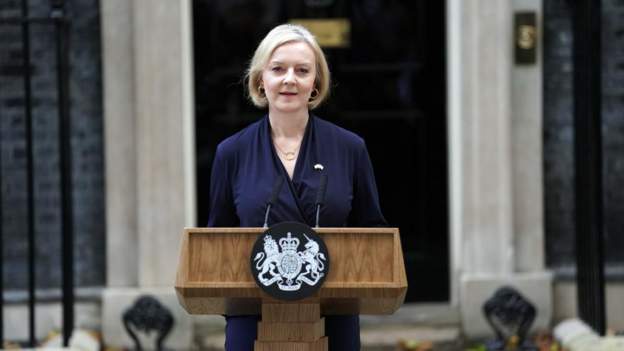
Liz Truss’s exit kicks off another Tory leadership race
Britain's Fourth Prime Minister in six years, Liz Truss, quit last Thursday as Prime Minister of UK after just 45 days in office thus making her term the shortest, most chaotic tenure of any British PM triggering the second Tory leadership election in four months.
She was forced out after her economic programme shattered the country's reputation for financial stability and left many people poorer.
Truss has faced mounting criticism after a tax-cutting mini budget unravelled spectacularly last month, sending markets and the pound sterling into freefall.
The Conservative Party, which holds a big majority in parliament and needs not call a nationwide election for another two years, will now elect a new leader by October 28, a fifth.
Next race for Downing Street
The contest for Britains fifth PM is likely to won by Rishi Sunak, the former Goldman Sachs analyst who became Finance Minister just as the COVID-19 pandemic arrived in Europe. While he has been proven right in his warnings that Truss's fiscal plan threatened the economy, he remains deeply unpopular with some Conservatives after he helped to trigger the summer rebellion against Johnson.
Penny Mordaunt, a popular former defence minister, could also run, with other possible hopefuls such as Suella Braverman, the Interior Minister who quit last Wednesday, and Trade Minister, Kemi Badenoch, unlikely to reach the 100 nominations and it could also see the return of Boris Johnson, who was ousted as Prime Minister in July when his ministers resigned en masse to force him out of office. Johnson, who still faces an investigation into whether he misled parliament after he and his staff held a string of parties during COVID-19 lockdowns, may also be a candidate.
Conservatives
One of the most contentious issues facing the Conservatives is how they elect a new leader, after the party's 170,000 members chose Truss over the wishes of its elected lawmakers at Westminster. Groups within the party have battled over the direction of the country since the Brexit vote.
In previous contests, the candidates were whittled down to two through a number of lawmaker votes over weeks, before the membership selected the winner. Many Conservative lawmakers say that cannot be allowed to happen again.
"Members can't have a say, we have to sort this out," one lawmaker said. Asked if the party could rebuild its reputation from this point, he added: "Never in a million years".
Organisers said any candidate would need the backing of 100 lawmakers, and that if only one candidate passed that threshold by 2 p.m. (1300 GMT) on Monday, they would automatically become Prime Minister. If two candidates remain, party members will get an online vote.
Speech in Downing Street
The sight of yet another unpopular Prime Minister making a resignation speech in Downing Street and the start of a new leadership race underscores just how volatile British politics has become since the 2016 vote to leave the European Union.
Speaking outside the door of her Number 10 office, Liz Truss accepted that she had lost the faith of her party and would step down next week. "I have, therefore, spoken to His Majesty the King to notify him that I am resigning as leader of the Conservative Party," said Truss, who was supported only by her husband with her aides as loyal ministers were noticeably absent.
Prime Minister
"I came into office at a time of great economic and international instability," Truss said. "Families and businesses were worried about how to pay their bills, Putin's illegal war in Ukraine threatens the security of our whole continent and our country has been held back for too long by low economic growth".
"We set out a vision for a low tax, high growth economy that will take advantage of the freedoms of Brexit," she said.
Allied leaders said they would continue to work with her successor and emphasised the importance of stability.
Ms Truss said her successor would be elected by next week after a rebellion by Tory MPs forced her to quit. A number of MPs are considering bids but Chancellor Jeremy Hunt has ruled himself out.
Tory MPs revolted
Tory MPs revolted against Ms Truss after a series of U-turns on her economic plan sapped her of authority. In a brief speech outside Downing Street, Ms Truss said the Conservative Party had elected her on a mandate to cut taxes and boost economic growth.
But given the situation, Ms Truss said: "I recognise that I cannot deliver the mandate on which I was elected by the Conservative Party".
Ms Truss said she would remain in post until a successor formally took over as party leader and was appointed prime minister by King Charles.
Truss elected as PM
Truss was elected in September to lead the Conservative Party by its members, not the broader electorate, and with support from only around a third of the party's lawmakers.
She had promised tax cuts funded by borrowing, deregulation and a sharp shift to the right on cultural and social issues. But within weeks, she was forced to sack her Finance Minister and closest political ally, Kwasi Kwarteng, and abandon almost all her economic programme after their plans for vast unfunded tax cuts crashed the pound and sent British borrowing costs and mortgage rates soaring while approval ratings for her and the party collapsed.
Last Wednesday, she lost the second of the government's four most senior ministers, faced laughter as she tried to defend her record to parliament and saw her lawmakers openly quarrel over policy, deepening the sense of chaos at Westminster.
Truss will enter the history books as the prime minister with the shortest tenure, replacing George Canning, who had held the role for 119 days when he died in 1827.
